2023 YEAR-END REPORT
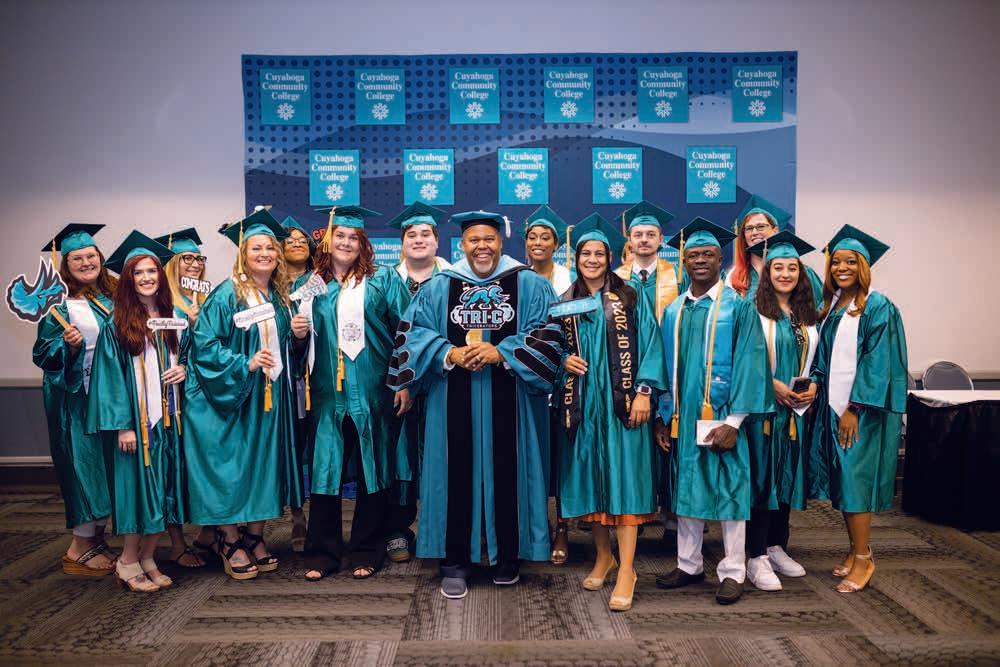

 1963-2023
1963-2023
(One
• Build an exceptional and inclusive cabinet, developing systems to ensure all employeeoriented decisions and processes align with student success goals.
• Analyze student outcome data at cabinet level to determine priorities leading to student success strategies Collegewide.
• Build highly effective student-oriented culture that supports inclusive excellence.
• Develop effective communication plans to facilitate change management. GOAL
• Build a culture of inquiry and data through centralized strategy.
• Prioritize execution of comprehensive strategies.
• Engage in evidence-based student success reforms designed to improve transfer at scale, support teaching and learning as a priority, and align programs with labor market to support Tri-C’s diverse student population.
• Develop Collegewide Academic Plan to better inform Integrated Facilities Plan and Strategic Enrollment Plan.
• Use Lean Six Sigma methodology to analyze and improve enrollment processes.
• Prioritize review of academic advising, personal counseling and career development strategies to improve the student academic experience and address rising mental health concerns.
• Examine and improve support to and success rates of students gaining workforce credentials — degree and nondegree seeking.
• Develop systems to ensure that all College resources — financial, informational and those accessed through external partnerships — align with Tri-C mission.
• Demonstrate commitment to value proposition of community support by promoting and achieving passage of November 2023 levy.
GOAL 4 Increase College Visibility .................................................................................
• Build deep, mutually beneficial relationships with diverse partners including employers, K-12 schools, four-year universities and political players.
25
• Position Tri-C as a thought leader by communicating how we use knowledge of student success strategies to lead internal transformational change and develop external partnerships with K-12 schools, universities, community-based organizations and employers.
• Enhance awareness of Cuyahoga Community College as driver and leading voice on economic and social mobility in Northeast Ohio.
GOAL 5 Further Enhance Fundraising Approach..............................................................
• Secure additional commitments from College supporters by effectively communicating realities of post-pandemic environment with transparency and candor.
• Strategically allocate and raise funds to support key student success goals.
31
EXECUTIVE SUMMARY 4 KEY ACCOMPLISHMENTS ........................................................................................... 5
TABLE OF CONTENTS
GOAL 1 Develop and Drive Strategic Vision
College 3.0) ............................................ 7
Relevance of Programs,
and
to People and Markets Served .......................................................................... 13
2 Ensure
Facilities
Services
GOAL 3 Ensure Sound Fiscal Environment
21
FY23 AWARDS AND RECOGNITIONS ........................................................................ 34 THANK YOU 35 3
Executive Summary
My first year at Cuyahoga Community College (Tri-C®) was filled with listening, learning, collaborative planning and action. It was a year of celebrating our past and aligning our resources to ensure an even brighter and more purposeful future.
In short, it was a year of important strategic changes and initiatives that continue to build momentum.
It began with a series of listening sessions where I learned how invested in Tri-C our, students, employees and the community are, and how passionate they are about helping to envision and create our future.
My First 100 Days report reflected what I learned and provided a framework for our work moving forward:
• Everything will be values-centered, studentfocused and purpose-driven.
• Our work will address three overarching themes: building a culture of clarity, redesigning the student experience and strengthening the College’s value proposition.
We have acted on these values and themes.
One critically important initiative involves a review of our enrollment process. Corporate College professionals trained in Lean Six Sigma worked with a cross-functional, Collegewide team to identify ways to streamline the process and remove barriers to entry.
We made strategic changes and additions to the leadership team. Renee Richard, general counsel, became the president and CEO of Corporate College. Under Renee’s leadership, we have enlisted external consultants to help us evaluate Corporate College’s business model and market potential to better position and leverage this important training and professional development asset.
Shana Marbury was appointed executive vice president of Workforce, Community and Economic Development; India Pierce Lee as executive vice president and chief strategy officer; and Eric Gordon as senior vice president of Student Development and Education Pipeline.
Shana came to us from the Greater Cleveland Partnership. In her first year on the job, she has taken steps to increase the visibility of Workforce programming on our campuses and in the community.
India came to Tri-C from the Cleveland Foundation. In her short time here, she has successfully launched the Institutional Advancement Council, a group of College leaders who will help guide decision-making for the institution moving forward.
Eric spent the past 12 years as the CEO of the Cleveland Metropolitan School District. In addition to leading a new P-20 strategy for the College, his deep knowledge will inform initiatives to enhance the student experience.
Under my direction, the executive leadership team created the One College 3.0 Plan, which takes all of these values, principles and ideas and aligns them with large-scale goals to put all students on a pathway to a credential of value that supports their personal, career and economic aspirations and aligns with our region’s economic development goals.
To that end, we have continued to build and strengthen our partnerships with key organizations and businesses to align and update career pathways, helping to ensure that businesses throughout Northeast Ohio have the talent they need to propel themselves and our economy forward.
As we celebrate Tri-C’s 60th anniversary, we are mindful of the great strides my predecessors took in shaping this College to serve the ever-changing needs of this region. Charles Chapman, Nolen Ellison, Jerry Sue Thornton and Alex Johnson gave us a powerful legacy and a strong foundation to build upon.
We are stewards of a great institution that is critical to so much of what this region is and will become. In the rest of this report, you’ll learn much more about the progress we’ve made in the past year as we continue to work toward our Collegewide goals, steadily building momentum and enriching Tri-C as a resource and asset that tens of thousands of Northeast Ohioans turn to each year.
Sincerely,
Michael A. Baston, J.D., Ed.D. President, Cuyahoga Community College
4
Key Accomplishments
Build a Culture of Clarity
• Created new strategic metrics dashboards to provide real-time updates of student outcome data.
• Conducted in-depth research on community college best practices for aligning academics and workforce into a “school” model. Proposed the new structure to the Board of Trustees and introduced it to all College constituencies.
• Worked with the Society for College and University Planning to begin developing the first Collegewide Academic Plan.
• Began an integrated planning process for both facilities and academics that will inform the facilities and enrollment plans.
• Launched the Institutional Advancement Council, a group of College leaders who will help guide decision-making for the institution.
Redesign the Student Experience
• Improved student register and pay process by:
• Implementing a “register now, pay later” process with an extended window for selfpayment
• Extending registration through the first day of the semester
• Developing a “hold” process to ensure financial aid and veteran students are not dropped from classes for nonpayment
• Implemented a review of the College’s enrollment process to shorten the time to enrollment and remove barriers.
• Collaborated with nationally recognized experts, including the National Academic Advising Association, to review and create a comprehensive advising system that supports academic and career advising and mental health counseling.
• Implemented QuadC: Student Success and Retention Software to connect students with resources and provide counselors with alerts to quickly respond to at-risk students.
• Identified additional funding to support the access and retention of minority students through projects such as foreign transcript translation services and the Black and Brown Male Summit.
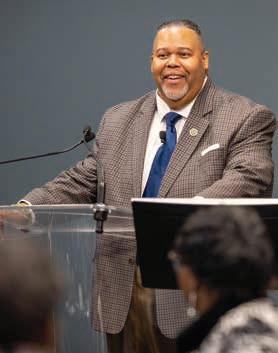
Strengthen the College’s Value Proposition
• Reached the $50 million goal for the Skills to Succeed Campaign seven months ahead of schedule. The campaign has now raised more than $58 million to prepare students for the jobs of the future.
• Developed new customized training engagements that include credential attainment for ClevelandCliffs Inc., Norman Nobel Inc., Zoresco Equipment Company, Steel Warehouse, Manufacturing Works, Nestlé, Avery Dennison and others.
• Created 81 job shadowing experiences at organizations such as MetroHealth, Orange Place Family Dentistry, College Now and the FBI that benefited 67 students.
• Developed advanced programming and credentials to provide clear pathways to industry jobs in areas such as Integrated Systems Engineering Technology, Welding, Mechanical Engineering Technology, Smart Manufacturing Technology, Cisco, Information Technology Fast Track Training and Community Health Worker.
• Partnered with universities and colleges, the state of Ohio and various government agencies to help finance the development of new programs and support scholarships.
5
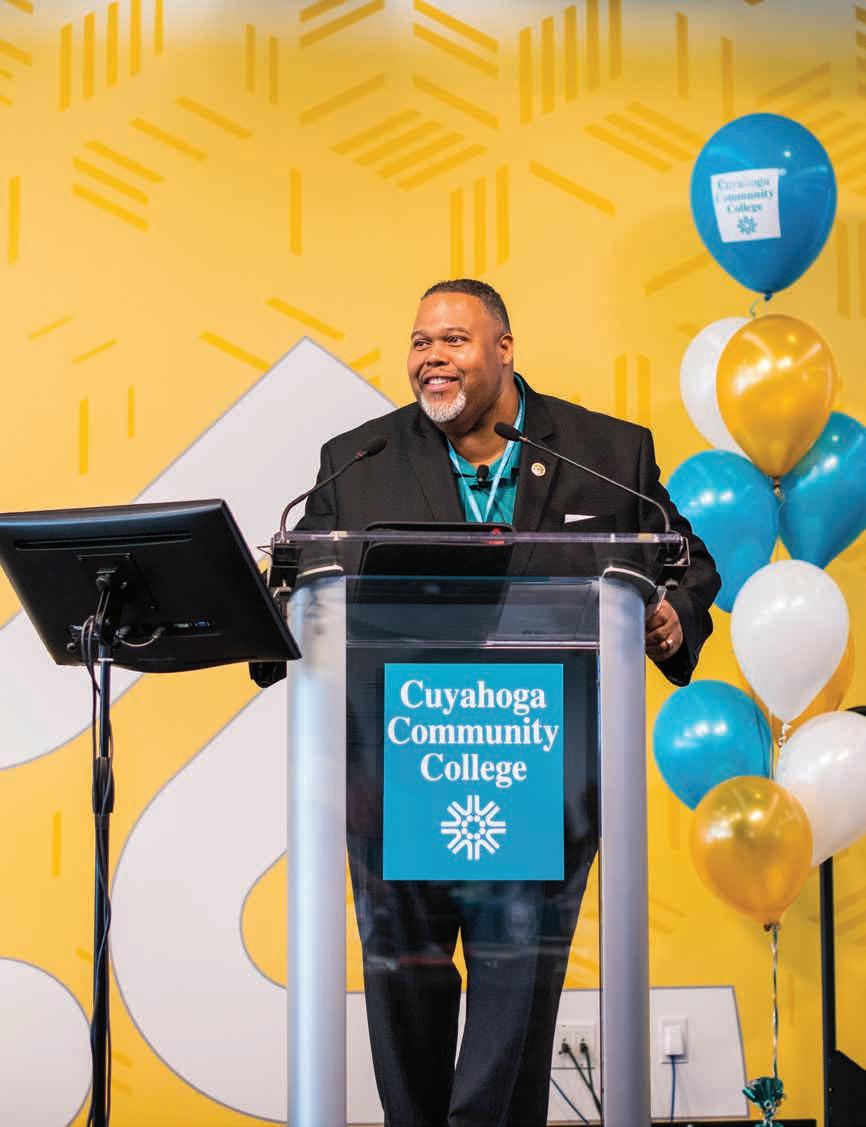

Develop and Drive Strategic Vision (One College 3.0) 7 2023 YEAR-END REPORT
GOAL 1
Build an exceptional and inclusive cabinet, developing systems to ensure all employee-oriented decisions and processes align with student success goals.
The Institutional Advancement Council, comprised of 13 vice presidents and three executive directors, launched in June. The Council will evaluate and make recommendations to executive leadership on grant proposals, programs and initiatives that focus on student success and align with presidential and divisional goals.
• Strengthen AL&S leadership and divisional partnerships to remove barriers and create stronger, more collaborative approach to employee and student support.
AL&S leadership participated in an integrated planning process for facilities and academics, providing a deeper understanding of other divisional processes, issues and needs. This will enable AL&S to move forward in a more collaborative manner to address administrative issues and support student success.
• Continue emphasizing importance of workforce education to students, employers and community.
WCED EVP Shana Marbury was interviewed by WOVU about the College’s workforce programs. Topics covered included customized training programs, career placement and how workforce partnerships benefit students, employers and the region.
EVP Marbury was also featured on the cover of Phenomenal Woman Magazine. She discussed Tri-C’s role as an “asset and anchor institution in the community” helping create economic mobility for residents through workforce training.
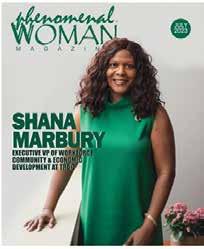
WCED’s Recruitment Specialist visited numerous greater Cleveland area high schools to promote workforce programming, connecting with more than 1,000 students and their guidance counselors.
• Leverage performance management system and refine employee goal structure to align with Collegewide student success goals.
Multiple employee focus groups assessed the current performance management system. Based on their feedback, the system was revamped to provide a more meaningful review process and better align goals and competencies with the College’s strategic and student success goals. The new system will launch in FY24.
• Engage student resource groups to help identify and remove barriers to success.
The College worked closely with groups such as the Black American Council and Hispanic Council to identify opportunities for additional funding to support access and retention of minority students. Examples of projects funded include foreign transcript translation services and the Black and Brown Male Summit.
• Analyze hiring processes and identify opportunities to improve diversity and inclusion, employee recruitment and employee retention.
Access, Learning and Success (AL&S)
Workforce, Community and Economic Development (WCED)
Administration and Finance (A&F)
*Work is in progress or scheduled to begin in 2024-2025.
The Talent Acquisition team worked with hiring managers, employee resource groups and College councils to identify new ways to advertise open positions to diverse populations. These include, professional and alumni associations, niche groups, colleges and universities and email lists specific to an industry or discipline.
Human Resources worked with hiring managers, search committees and interview teams to ensure diversity among participants. This included mandatory DEI training to mitigate bias in the screening and selection process.
8
GOAL 1: DEVELOP AND DRIVE STRATEGIC VISION (ONE COLLEGE 3.0)
Analyze student outcome data at cabinet level to determine priorities leading to student success strategies Collegewide.
• Continue to define and refine Collegewide metrics, using current, predictive and historical data to drive process improvement for student success.
Evidence and Inquiry reviewed existing academic metrics. Definitions were updated and standardized; several metrics were expanded. Updated metrics are available through an interactive dashboard and can be disaggregated by campus, equity cohort, full- and part-time students and year. The enrollment bulletin is updated daily to provide staff and faculty with the latest information.
• Establish clear measurable student success targets that integrate labor market outcomes (e.g., graduate employment and earnings).
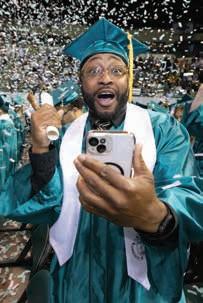
– Support student outcome data analysis with provision of more accurate student placement/tracking data (GradCast).
Partnered with GradCast to contact WCED program completers (from the last 18 months) to determine how many are employed in their field of study.
• Through the collaborative efforts of Information Technology Services (ITS) and Evidence and Inquiry, ensure use of best possible system(s) to store, analyze and share student outcome data.
New strategic metrics dashboards, created and posted to my Tri-C space, provide real-time updates of student outcome data.
Evaluation of potential software and systems continues, informed by the recent Workforce Immersion trip to community colleges in Florida, and through the ITS/Evidence and Inquiry collaboration.
• Develop dashboards to better analyze State Share of Instruction (SSI) data at program level.
Created new SSI dashboards to provide disaggregated data across all components of the SSI funding formula, including program specific SSI data to better inform institutional planning.
Access, Learning and Success (AL&S) Workforce, Community and Economic Development (WCED) Administration and Finance (A&F)
*Work is in progress or scheduled to begin in 2024-2025.
9 2023 YEAR-END REPORT
VISION (ONE COLLEGE 3.0)
Build highly effective student-oriented culture that supports inclusive excellence.
• Implement mandatory checkpoints throughout student journey to provide appropriate and equitable academic and personal support that improves success and equity outcomes.
AL&S is creating mandatory student checkpoints to determine if there are unmet academic or personal needs. These checkpoints help staff connect students to resources at the College and in the community.
Other projects have incorporated this practice, including the Kaizen enrollment process review, academic counseling review, creation and implementation of the “schools” model and creation of the Collegewide Academic Plan.
• Extend wraparound services (e.g., tutoring, counseling, transportation, computer labs, recreation) to noncredit/workforce students.
The Work Readiness Fund has supported 89 individuals in various programs with technology purchases, emergency funding, program-required vaccinations, certification exams and student materials and supplies. Funding has ranged from $100 to $1,200 per student.
The Advanced Technology Academy provided a holistic experience for students that includes access to training and wraparound support services. These services include job placement assistance, barrier removal and soft skill instruction.

The Upward Bound program (precollege readiness) provided wraparound services to students in grades 9-12 during the academic year and summer. The services included tutoring, transportation, College tours and admission assistance, enrichment activities, meals, stipends and more.
Access Centers partners also assisted with wraparound services, including housing, food insecurity and assistance applying for Cuyahoga County services.
• Explore and implement tool to capture student and employee feedback on College culture.
Formed the Tri-C Culture Climate Survey Committee, comprised of faculty and staff, to plan for the administration of the Higher Education Data Sharing Consortium DEI Climate Survey, which will launch in October 2023.
• Implement new and expand existing debt forgiveness programs.
A total of 168 students enrolled or re-enrolled through the following programs:
• The College Comeback Program offered up to $1,000 in debt forgiveness to encourage stopped out students with an account balance to return to Tri-C.
• In partnership with College Now and the Higher Education Compact of Greater Cleveland, the Reducing Barriers pilot program gives students extended payment plan options. It allows re-enrollment as well as a $200 grant match incentive.
Access, Learning and Success (AL&S)
Workforce, Community and Economic Development (WCED)
Administration and Finance (A&F)
*Work is in progress or scheduled to begin in 2024-2025.
• The Ohio Compact — a collaborative effort among Tri-C and six Northeast Ohio higher education institutions — provides students with up to $5,000 in debt forgiveness and transcript release when they reenroll in a participating institution.
10
1: DEVELOP
GOAL
AND DRIVE STRATEGIC
Develop effective communication plans to facilitate change management.
• Collaborate with Integrated Communications department and other divisions to build thoughtful and respectful communication plans spanning a variety of modalities to ensure all constituent groups receive timely, consistent and accurate information about new College initiatives.
The provost sends a twice-monthly newsletter to faculty with information on Tri-C projects and events, as well as issues affecting the College or higher education.
Created a communication plan to introduce the “school” model. It included meeting with each constituency group, beginning with the Cuyahoga Community College Board of Trustees and ending with Town Hall meetings for the entire College.
The provost’s office collaborated with faculty leadership to announce the academic counseling review and launch of the academic planning process.
The provost held a series of “Coffee and Conversation” meetings with faculty at each campus to provide more information about the counseling review, academic plan and “schools” model while addressing specific faculty concerns.
The provost and associate provost continue to meet with the president of the American Association of University Professors (AAUP) and the Joint Faculty Senate Committee (JFSC) chair during the summer to keep faculty up to date.
The provost is recording regular video updates to provide the entire College community with timely information on initiatives.
• Strengthen internal partnerships to prevent course overlap and/ or competition.
The Workforce Cisco program and the IT Center of Excellence partnered with the Manufacturing/Engineering department to continue developing the Smart Manufacturing four-year degree program.
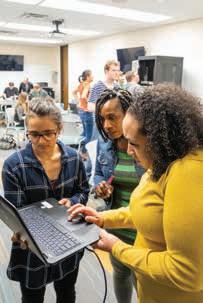
• Develop comprehensive tactical plan to effectively communicate change initiatives (what/why) to employees.*
Access, Learning and Success (AL&S) Workforce, Community and Economic Development (WCED)
Administration and Finance (A&F)
*Work is in progress or scheduled to begin in 2024-2025.
11 2023 YEAR-END REPORT
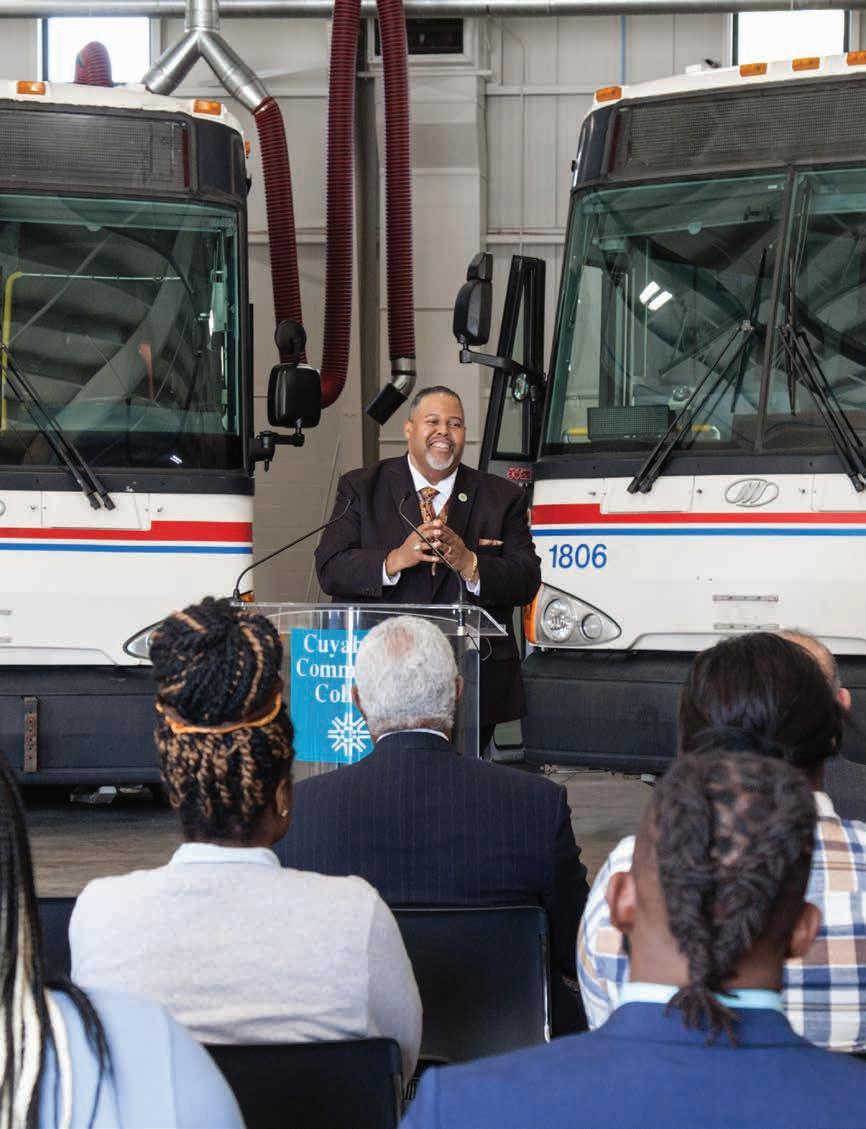
GOAL 2
Ensure Relevance of Programs, Facilities and Services to People and Markets Served

13 2023 YEAR-END REPORT
Build a culture of inquiry and data through centralized strategy.
• Strengthen partnerships with Team NEO, Lightcast and other organizations to obtain most relevant environmental and career data to inform academic direction.
Engaged with Team NEO, Lightcast, the Community College Research Center, College Now and numerous regional employers to gather data on the job and career market in Northeast Ohio.
Planned an in-depth environmental scan — which will include career information — to launch late summer or early fall.
• Lead professional development and strategy formation with College deans through Deans Institute.
Team NEO worked with the Deans Institute throughout the year to help them learn more about the regional economy and consider career and employment opportunities as they create and align programs and certificates.
• Develop process to evaluate the quality, viability and sustainability of existing programs; review and refine process for approving new noncredit certificate programs.
Engaged a consultant to conduct a program review that included financial viability and new program recommendations. Results are being considered and will be implemented over the next fiscal year.
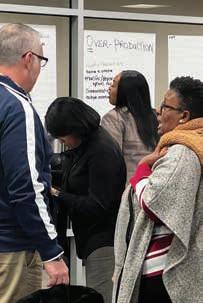
• Continually review skill gap trends, demographic changes and trajectory to family-sustaining wages.
Worked with employers and intermediary organizations such as MAGNET, Team NEO and Manufacturing Works to stay in touch with industry needs. Programs under review to ensure we are preparing students for jobs in Ohio include electric vehicle, fiber optic, utility worker, bio med manufacturing, aerospace, medical manufacturing readiness, Cisco and community health worker.
The Hospitality Management Center relaunched the Certified Dietary Manager Certificate of Proficiency program to fill a growing need within food service industry driven by the aging population. Students who receive a certificate from Tri-C and pass a national test, can enter this high-demand field with starting wages of $45,000 to $50,000 per year.
Access, Learning and Success (AL&S)
Workforce, Community and Economic Development (WCED) Administration and Finance (A&F)
*Work is in progress or scheduled to begin in 2024-2025.
14
GOAL 2: ENSURE RELEVANCE OF PROGRAMS, FACILITIES AND SERVICES TO PEOPLE AND MARKETS SERVED
Prioritize execution of comprehensive strategies.
• Ensure AL&S priorities and strategies align with those of President’s Office and other divisions.
Worked closely with the President’s Office to realign areas of academic responsibility with the strategic vision — specifically community outreach, K-12 programs and Evidence and Inquiry.
Scheduled regular one-on-one meetings with the executive vice presidents of Administration and Finance, Workforce, and Strategic Planning to ensure all areas of the College are working in alignment with the president’s strategic initiatives and goals.
• Use AL&S scorecards to develop, monitor and assess progress on strategic priorities and projects.
In 2022, campus presidents and academic vice presidents developed scorecards based on the Completion by Design framework. It focuses on four areas of the student journey that increase success and completion: connection, entry, progress and completion. Each president or vice president created goals, strategies, tactics and success metrics in the four areas. The scorecards were updated midyear to reflect progress.
• Establish continuous improvement processes that include developing, aligning, monitoring and assessing progress on strategic priorities and projects.
The WCED Leadership Team has embedded continuous improvement topics into meeting agendas and is implementing a process to better manage capital equipment needs for the division.
Engage in evidence-based student success reforms designed to improve transfer at scale, support teaching and learning as a priority, and align programs with labor market to support Tri-C’s diverse student population.
• Lead and implement evidence-based student success reforms
(e.g., creating new advising system, identifying 21st-century goals within humanities courses, creating mandatory checkpoints to provide individualized support).
Launched a review of academic advising in Spring 2023. A proposed new academic counseling structure will include wellness counseling and mandatory checkpoints for students.
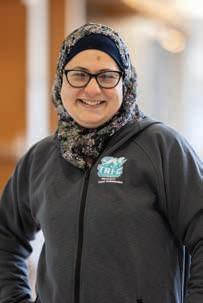
• Develop financial metrics and program analysis process that allow for evaluation of Tri-C against peer institutions and comparisons between campuses/sites
Developed dashboards to compare data with seven community college peer institutions. Campus financial metrics include site-specific data related to institutional expenses per headcount/full-time equivalent (FTE), student headcount/FTE per staff and student headcount/FTE per faculty.
Access, Learning and Success (AL&S) Workforce, Community and Economic Development (WCED) Administration and Finance (A&F)
*Work is in progress or scheduled to begin in 2024-2025.
15 2023 YEAR-END REPORT
Develop Collegewide Academic Plan to better inform Integrated Facilities Plan and Strategic Enrollment Plan.
• Engage consultant(s) to work with AL&S leadership, deans and faculty to lead and create Collegewide academic planning process (beginning Spring 2023).
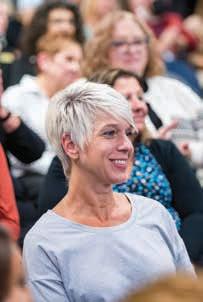
Working with the Society for College and University Planning, began development of the College’s first Collegewide Academic Plan. A crossfunctional core team held four meetings. A draft of the plan is scheduled for completion by Spring 2024.
• Provide workforce noncredit input on planning processes.
Participated in and provided noncredit input to the Master Planning Steering Committee and the Core Planning Group. Provided input to various College committees such as the Faith-Based Committee, Community Relations Committee and Veterans Committee.
• Develop Integrated Facilities Plan that utilizes data to support and complement Collegewide Academic Plan and Strategic Enrollment Plan. Gathered input via more than 20 employee, student and community focus groups. Additionally, a survey of more than 1,330 faculty, staff, students, community members and trustees was conducted to inform the planning process. All work on the facilities plan is aligned with the strategic goals of the College’s Academic Plan.
• Ensure Capital and Construction projects provide best possible educational and training environment for students.*
• Continue implementing Collegewide Sustainability Plan.
Multiple energy conservation measures (ECMs) reduced the College’s time to carbon neutrality by 10 years, with a planned achievement of the goal in 2040.
Partnered with the Ohio Facilities Construction Commission to issue an RFP to engage an energy services company to implement additional ECMs. Piloted electric fleet vehicles and equipment.
Through continued coordination with the Northeast Ohio Areawide Coordinating Agency, developed plans to install electric vehicle charging stations at three potential College locations — the Metropolitan, Eastern and Western campuses — by the end of 2023.
Access, Learning and Success (AL&S)
Workforce, Community and Economic Development (WCED) Administration and Finance (A&F)
*Work is in progress or scheduled to begin in 2024-2025.
16
GOAL 2: ENSURE RELEVANCE OF PROGRAMS, FACILITIES AND SERVICES TO PEOPLE AND MARKETS SERVED
Use Lean Six Sigma methodology to analyze and improve enrollment processes.
• Lead the Kaizen enrollment process review project and implement proposed outcomes.
Engaged a cross-functional team in a Kaizen event to evaluate and improve recruitment, enrollment and retention processes. The initial four-day event focused on streamlining the enrollment process. The team identified many time-consuming, redundant or confusing steps — some with significant lag times between them. Initial recommendations will reduce the number of steps by 68%. Additional reductions requiring technology upgrades or alignments are anticipated.
• Develop Lean Six Sigma competencies within Workforce leadership team. The Tech Prep office implemented Lean Six Sigma methodology to analyze and improve enrollment processes.
WCED leadership team will complete Lean Six Sigma training over the next six months.
• Sunset duplicative IT systems and promote better utilization of those that remain.
Reviewed potentially redundant or obsolete systems and software. Exploration of options to better support the College’s strategic goals is underway.
• Review and improve student register and pay process. Evolved process to “register now, pay later” with an extended window for self-payment.
Extended registration through the first day of the semester.
Developed “hold” process to ensure financial aid and veteran students are not dropped from classes for nonpayment.
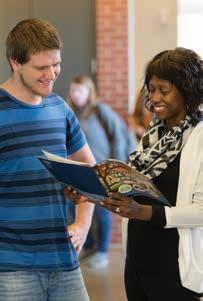
• Design and implement HR strategy that supports improved enrollment process.*
Access, Learning and Success (AL&S)
Workforce, Community and Economic Development (WCED) Administration and Finance (A&F)
*Work is in progress or scheduled to begin in 2024-2025.
17 2023 YEAR-END REPORT
Prioritize review of academic advising, personal counseling and career development strategies to improve the student academic experience and address rising mental health concerns.

• Collaborate with nationally recognized experts, including National Academic Advising Association, to review and create comprehensive advising system that supports academic and career advising as well as mental health counseling.
Sent a survey to faculty, administration and students asking for input on Tri-C’s academic advising. Results are being examined with NACADA, and a work plan will be created to engage students, deans and faculty during the fall and spring semesters of the next academic year.
• Leverage existing IT systems to support efficient scheduling and appointment management for advising, counseling and other support services.
Worked with Counseling to implement QuadC: Student Success and Retention Software to connect students with resources and provide counselors with alerts to quickly respond to at-risk students.
• Ensure multiple modes of support are available to address mental health concerns.*
Access, Learning and Success (AL&S)
Workforce, Community and Economic Development (WCED)
Administration and Finance (A&F)
*Work is in progress or scheduled to begin in 2024-2025.
18
GOAL 2: ENSURE RELEVANCE OF PROGRAMS, FACILITIES AND SERVICES TO PEOPLE AND MARKETS SERVED
Examine and improve support to and success rates of students gaining workforce credentials — degree and nondegree seeking.
• Collaborate with WCED to create new short-term certificates, embedded certificates and post-degree credentials.*
• Develop new programming and seamless pathways between credit and noncredit disciplines.*
• Develop additional advanced programming and credentials. New training engagements that include credential attainment were developed for Cleveland-Cliffs Inc., Norman Nobel Inc., Zoresco Equipment Company, Steel Warehouse, Manufacturing Works, Nestlé, Avery Dennison and others.
Developed new programs to provide clear pathways to industry jobs in areas such as Integrated Systems Engineering Technology, Welding, Mechanical Engineering Technology, Smart Manufacturing Technology, Cisco, Information Technology Fast Track Training and Community Health Worker.
At the urging of our Industry Advisory Committee, the Hospitality Management Center established a post-graduate certificate in pastry arts. Added four additional courses to the Information Technology Fast Track Program. We are considering adding CompTIA project+ and CompTIA Network+.

• Develop communication schedule and performance reports to share at biweekly checkpoints with students experiencing barriers.*
• Investigate and integrate additional wraparound services, using equity lens to expand support for workforce students.
Recent funding from KeyBank, Cleveland-Cuyahoga County Ohio Means Jobs, the Reinberger Foundation and the city of Cleveland ARPA have wraparound supports with an equity focus embedded in the project plans.
• Partner with academic leadership to create new short-term certificates, embedded micro-credentials and post-degree credentials.
The Hospitality Management Center reviewed micro-credentials embedded in existing courses and developed industry-relevant short-term, noncredit certificates.
IT noncredit and credit partnered with SkillStorm to offer online instructorled courses that lead to industry standard certifications, such as AWS and Salesforce. Students completing the AWS course will receive college credit after passing the certification exam.
The Bachelor of Applied Science in Integrated Digital Manufacturing Technology is currently being reviewed. This program has over 30 short-term certificates embedded into its design.
• Develop new programming and seamless pathways between credit and noncredit disciplines.
The IT Center of Excellence is working with the Greater Cleveland Partnership to create a registered software apprenticeship bootcamp. Students will complete a 14-week software developers academy followed by two ondemand courses.
Access, Learning and Success (AL&S)
Workforce, Community and Economic Development (WCED)
Administration and Finance (A&F)
*Work is in progress or scheduled to begin in 2024-2025.
19 2023 YEAR-END REPORT
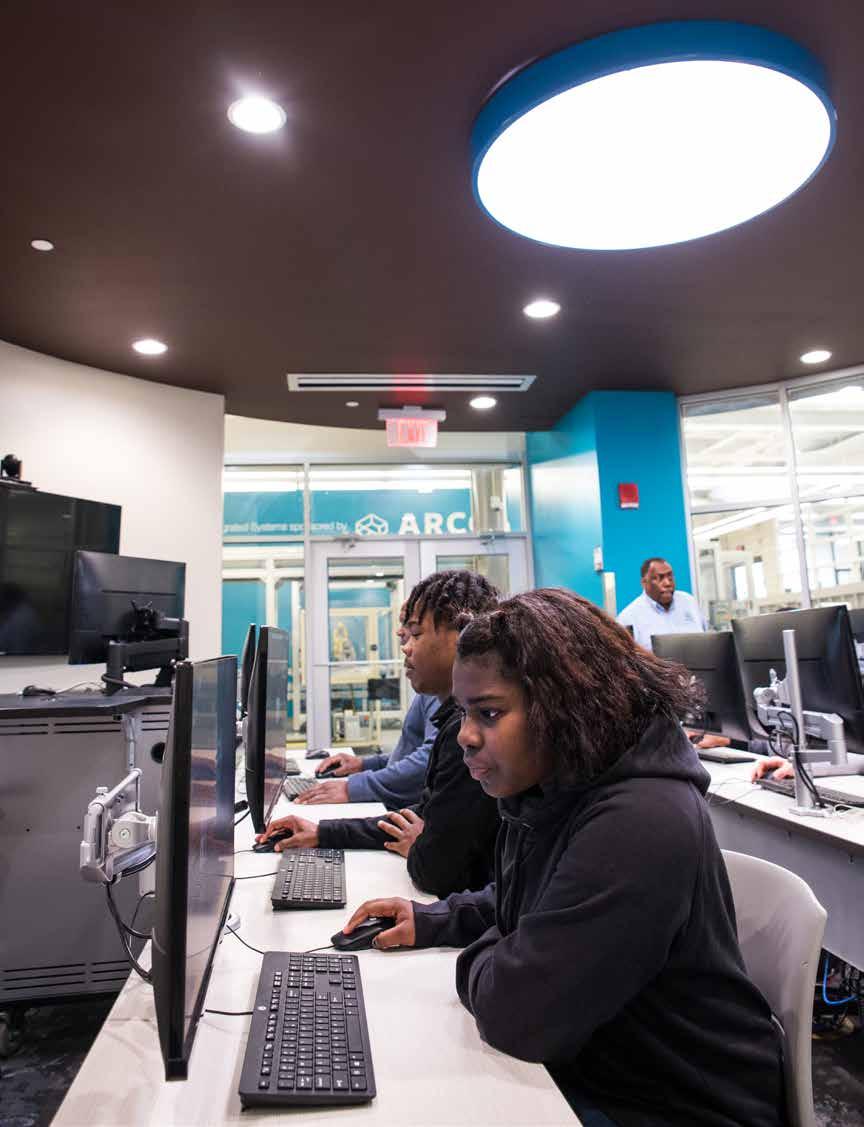

Ensure Sound Fiscal Environment 21 2023 YEAR-END REPORT
GOAL 3
Develop systems to ensure that all College resources — financial, informational and those accessed through external partnerships — align with Tri-C mission.
Tri-C contributes $1.5 billion annually to the Cuyahoga County economy and supports nearly 19,000 jobs. Additionally, for every $1 invested into Tri-C, society sees a return of $11.80, according to an Economic Impact Analysis conducted in FY23.
• Utilize a division-wide approach to managing financial resources that ensures alignment with strategic goals while maximizing efficiencies and eliminating redundancy.*
• Partner with A&F to plan several years of strategic priorities, student programs, etc. in relation to the overall operating budget.*
• Continue pursuing partnerships that create innovative revenue streams, including customized training and revenue-sharing arrangements.
Customized training was developed for Cleveland-Cliffs Inc., Norman Nobel Inc., Zoresco Equipment Company, Steel Warehouse, Manufacturing Works, Nestlé, Avery Dennison and others.
Partnered with universities and colleges, the state of Ohio and various government agencies (including National Science Foundation, Department of Labor and Health and Human Services) to help finance the development of new programs and support scholarships for students in existing programs.
• Ensure transparent and sound budgeting and financial planning processes (e.g., annual budget development and implementation, long-range financial planning).
Presented a proposed budget and long-range financial planning philosophies and goals to several groups, including budget unit leaders, President’s Cabinet, Collegewide Cabinet and the Board of Trustees, culminating with the passage of a balanced FY24 budget and long-range financial plan that aligns with the College’s strategic initiatives.
• Ensure contracts and purchases are negotiated for total value and directly serve institutional mission.
More than 40% of the College’s contracts are with consortia/purchasing groups, resulting in a 16% savings to the College as of May 30, 2023.
• Ensure appropriate utilization of financial and human resources through comprehensive personnel review and restructuring.
Completed a Collegewide compensation review for all nonexecutive level positions. College leadership is reviewing results with a presentation planned for Fall 2023.
Provided staffing and budgetary support for the implementation of the “school” model.
• Provide access to high-quality, affordable course materials.
Provided students with a mix of new, used, rental, digital and Open Educational Resource (OER) course options to ensure a high-quality and affordable selection of course materials. The efforts resulted in a 44% course material savings for students — the equivalent of $2.1 million, the greatest annual savings since the College began tracking this metric in FY10.
Access, Learning and Success (AL&S)
Workforce, Community and Economic Development (WCED) Administration and Finance (A&F)
*Work is in progress or scheduled to begin in 2024-2025.
22
GOAL 3: ENSURE SOUND FISCAL ENVIRONMENT
Demonstrate commitment to value proposition of community support by promoting and achieving passage of November 2023 levy.
• Empower division employees to serve as brand ambassadors, communicating the value of a Tri-C education to community members and supporting successful levy passage.
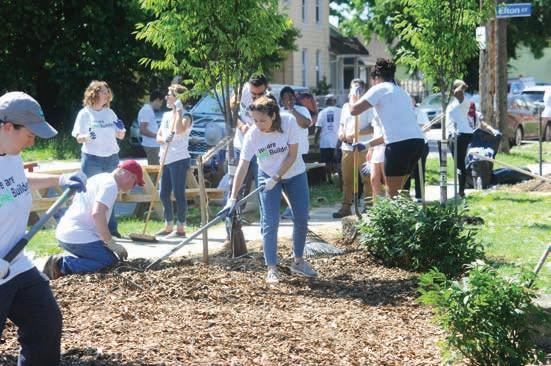
Engaged in numerous meetings, outreach activities, newsletters and videos throughout the year to highlight academic programs, transfer opportunities, access to Credit for Prior Learning, co-op and internship opportunities, youth and adult serving programs and dual enrollment for high school students. Educating the academic staff on these programs and the value proposition of a Tri-C education prepares them to serve as brand ambassadors and provide accurate and persuasive information to family, friends and others as we move into the fall levy campaign.
• Increase awareness of and support for levy campaign by acting as Tri-C brand ambassadors, sharing how workforce education leads to family sustaining wages and provides talent pipeline throughout region.*
The Citizens for Cuyahoga Community College campaign committee raised $950,000 for the November levy campaign and is on track to reach its $1.2 million goal. Plans for community outreach, media, phone banks, direct mail and more are underway. The majority of those polled in February are in favor of the levy.
Access, Learning and Success (AL&S) Workforce, Community and Economic Development (WCED) Administration and Finance (A&F)
*Work is in progress or scheduled to begin in 2024-2025.
23 2023 YEAR-END REPORT
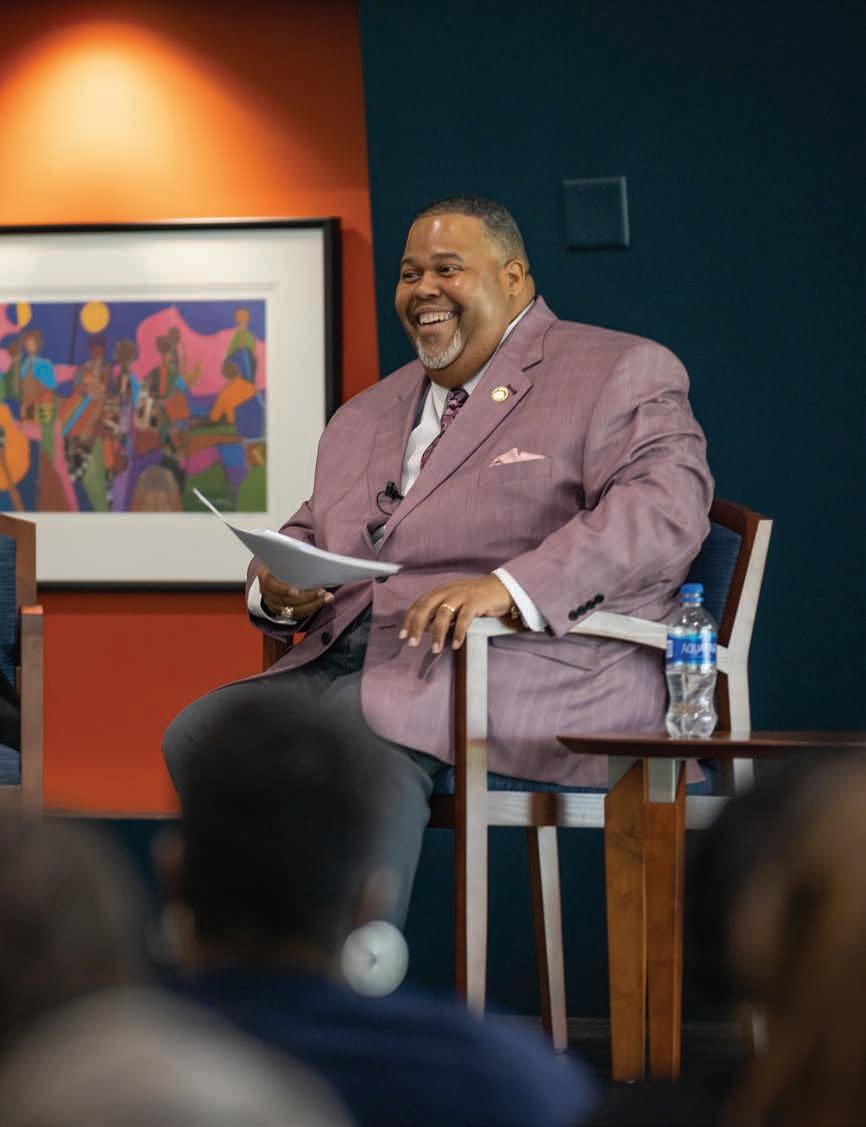
GOAL 4

Increase College Visibility 25 2023 YEAR-END REPORT
Build deep, mutually beneficial relationships with diverse partners including employers, K-12 schools, four-year universities and political players.
• Strengthen K-12 and university partnerships to create seamless transitions and maximize academic and financial support for successful matriculation from K-12 to Tri-C to four-year institution.
Created an associate vice president position for the College Credit Plus (CCP) program to design and implement a new infrastructure for CCP Collegewide and improve efforts to strengthen and create new partnerships with local public and private high schools.
The associate vice president will work closely with the new senior vice president of Student Development and Education Pipeline, the former CEO of Cleveland Metropolitan School District (CMSD).
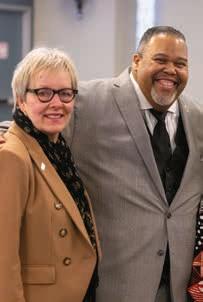
Reinvigorated High Tech Academy (HTA), a decade-long partnership with CMSD that allows HTA students to take courses at their high school in the morning and attend college classes at Tri-C’s Metropolitan Campus in the afternoon, earning college credit while working toward their high school diploma.
• Expand partnerships within community (beyond Tri-C Access Centers) to increase awareness and build new enrollment opportunities.
In collaboration with the President’s Office and Workforce, AL&S began discussions with MetroHealth to create new health care educational opportunities.
Worked collaboratively with the Association of Federal, State, County and Municipal Employees (AFSCME) to develop an employee tuition program for AFSCME members nationwide.
• Create opportunities at scale for K-12 superintendents, teachers, guidance counselors and other staff members to visit Tri-C campuses and learn about programs and services.
The Workforce Partnership team hosted the Public Safety Center of Excellence Showcase as part of the Ohio Means Jobs (OMJ) In-Demand Week. Over 70 high school students and their teachers explored the Public Safety facilities and participated in hands-on demonstrations. County Executive Chris Ronayne and executives from OMJ also attended.
• Conduct targeted outreach to maintain and expand relationships with growing employers and in growing sectors throughout Northeast Ohio.
The Manufacturing Technology Center of Excellence is working with premier companies in the area, such as Lincoln Electric, Swagelok, Cleveland-Cliffs Inc., Nestlé, Howmet Aerospace, Oatey, Charter Steel, the Northeast Ohio Regional Sewer District and many other smaller companies.
Created 81 job shadowing experiences at companies such as MetroHealth, Orange Place Family Dentistry, College Now and the FBI that benefited 67 students.
Access, Learning and Success (AL&S)
Workforce, Community and Economic Development (WCED)
Administration and Finance (A&F)
*Work is in progress or scheduled to begin in 2024-2025.
The Workforce Partnership team met with local companies, community agencies and community leaders to discuss employee tuition assistance and training opportunities. Companies included Future Plans, the City Mission, Nestlé, National Safety Apparel, Care Alliance Health Center, Howmet Aerospace, Evergreen Cooperatives, Arcadia Home Healthcare, Avery Dennison, Cleveland Builds, Garfield Heights Mayor Matt Burke, Ohio Means Jobs, and the Cleveland Clinic.
The Fire Training Academy participated in more than 24 onsite and offsite public education events.
26
GOAL 4: INCREASE COLLEGE VISIBILITY
• Convene industry leaders and other critical partners for scaled regional impact.
The WCED Board of Visitors, an advisory group of business and civic leaders representing a cross-section of industry in Northeast Ohio, advise the College on issues relating to workforce development strategy, training and talent development, economic impact, community engagement and partnerships, and meeting the needs of businesses, along with serving as public advocates for the College.
Demonstrated to elected officials how Tri-C prepares their constituents for good jobs. Visiting dignitaries included Governor Mike DeWine, Senator Sherrod Brown, Congresswoman Shontel Brown, Congressman Max Miller, Cleveland Mayor Justin Bibb, Cuyahoga County Executive Chris Ronayne, Cuyahoga County Council President Pernel Jones, Jr., Cleveland City Council President Blaine Griffin, and Ohio Chancellor of Higher Education, Randy Gardner. Tri-C also hosted the Cuyahoga County Mayors and Managers Association monthly meeting.
The Fire Training Academy annually hosts fire chiefs from Northeast Ohio to strengthen our partnership and understand the needs of the fire service community.
• Increase engagement with diverse vendors and suppliers through implementation of Economic Inclusion Plan.
Through the third quarter of FY23, the College had contracts with 275 diverse vendors (11% of total vendors), in line with the plan’s goal to increase the number of diverse vendors with contracts by 5% in FY23. Additionally, 12% of the College’s addressable spend was with diverse vendors, and 36% of addressable spend was with vendors in Cuyahoga County.
• Develop Joint Use Agreements with community partners in service of Tri-C and student success.
Developed new joint use agreements with community partners, including a partnership with Saint Vincent Medical Center, to provide Tri-C students with clinical experience related to mental health and chemical dependency, and an agreement with the Solon Innovation Center to connect students with workforce career opportunities.
• Explore prospective relationships with four-year universities through colocated campus locations.*
• Continue developing engagement with K-12 schools, including opportunities for greater collaboration and partnership with Cleveland Metropolitan School District (CMSD).
Recruited Eric Gordon as senior vice president of Student Development and Education Pipeline. This new position will identify and address gaps in student development and support systems and lead a new P-20 strategy for the College.
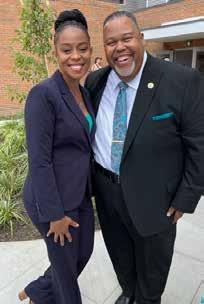
• Expand mutually beneficial relationships with community partners that support specific student populations (LGBTQ+, refugee/displaced student, students of color).*
Access, Learning and Success (AL&S) Workforce, Community and Economic Development (WCED)
Administration and Finance (A&F)
*Work is in progress or scheduled to begin in 2024-2025.
27 2023 YEAR-END REPORT
Position Tri-C as a thought leader by communicating how we use knowledge of student success strategies to lead internal transformational change and develop external partnerships with K-12 schools, universities, community-based organizations and employers.
• Three issues of Tri-C Times, the College’s award-winning magazine, shared stories of student and alumni success and the impact of Tri-C’s strategic initiatives, programs and partnerships. Approximately 30,000 copies of the spring and summer issues were packaged with Cleveland Magazine and Smart Business Magazine and distributed to the Greater Cleveland community. The issues and individual stories were also shared through social media and the Tri-C website.
TIMES
• Utilize best practices and research from nationally recognized community colleges to propose and implement new “school” model approach to academic programs at Tri-C, realigning leadership and faculty for improved student experience, more collaborative and effective Collegewide schedule, and greater staff and financial efficiencies. Conducted thorough and in-depth research on community college best practices for aligning academics and workforce into a “school” model. The new “schools” structure was proposed to the Board of Trustees and has been introduced to all College constituencies.
• Continue to serve and expand representation in groups and on committees that support and advocate for Tri-C mission. *


*Work is in progress or scheduled to begin in 2024-2025.
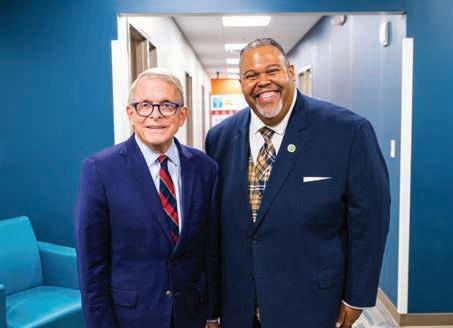
28
GOAL 4: INCREASE COLLEGE VISIBILITY
Access, Learning and Success (AL&S) Workforce, Community and Economic Development (WCED) Administration and Finance (A&F)
TRI - C® A PUBLICATION OF CUYAHOGA COMMUNITY COLLEGE IN THIS ISSUE P6: DREAMS AND PASSIONS FULFILLED P18: CHARTING A NEW COURSE SHEILA MILLER’S NURSING JOURNEY P22: SUSTAINABLE LEARNING MITIGATING EFFECTS OF CLIMATE CHANGE SUMMER 2023 FACES OF THE FUTURE SEEDS OF SUCCESS Tri-C's Plant Science and Landscape Technolog program takes first place in national competition
Enhance awareness of Cuyahoga Community College as driver and leading voice on economic and social mobility in Northeast Ohio.
• Expand alignment of and partnerships with key regional organizations like Cleveland State University, Ohio Association of Community Colleges, Team NEO, CMSD, Greater Cleveland Partnership and others to promote value proposition of community college workforce and credit education to students, industry, business and government and to support our equity and transfer agenda.
Worked closely with four-year partner Cleveland State University to expand the Level Up program, which provides outreach and support services to students from CMSD and other high schools that serve large minority populations
The Deans Council engaged Team NEO to learn more about the regional economy and the educational and workforce needs of employers.
Tri-C will host the Ohio Association of Community College’s Leadership Academy for Student Success in June 2024.
• Establish mobile Workforce offices to increase visibility of workforce programming at each campus and within community.
The HMC is exploring the feasibility of a mobile “food truck” to teach culinary medicine to community groups/neighborhoods.
• Work with local business and industry leaders to align and update career pathways that help build pipeline of skilled workers to meet regional demands.
Sent a survey to the Board of Visitors requesting feedback on how to train Cleveland Codes students on the skills companies are looking for in graduates.
Through program advisory committees, all WCED programs work with local business and industry leaders to align career pathways for skilled workers.
• Contribute to region’s health and well-being through annual Combined Campaign.
Raised $102,000 through the College’s annual combined campaign benefitting the United Way of Greater Cleveland, Greater Cleveland Community Shares and the United Negro College Fund. Since 1995, the campaign has contributed more than $2.7 million to our community partners ultimately supporting the citizens of Northeast Ohio.
• Effect positive change within Tri-C community through Stand for Racial Justice alliance.
Institutional and community programming through the Stand for Racial Justice (SJR) alliance included: food insecurity (presented in partnership with the Cleveland Food Bank); generational trauma of racism and hate (LGBTQ+) sessions; panel discussions on gender issues; and advocacy strategies for building sustainable communities for minority groups.
Representatives of the SRJ alliance were selected to participate in the American Association of Colleges and Universities’ Institute on Truth, Racial Healing & Transformation and collaborate with 71 national institutions to develop 150 nationwide community-integrated centers to erase barriers and promote racial healing.
• The Integrated Communications department produced 182 news releases and newsroom stories on student success, faculty innovation and communityfocused programs and events, resulting in more than 3,100 media mentions.
• Traffic driven to the College’s website from social media channels increased markedly YOY:
• Facebook from 43,000 to 201,000
• Instagram from 102 to 557

• LinkedIn from 12,000 to 38,000
• Twitter from 139 to 995
29 2023 YEAR-END REPORT

GOAL 5
Further Enhance Fundraising Approach

31 2023 YEAR-END REPORT
Secure additional commitments from College supporters by effectively communicating realities of post-pandemic environment with transparency and candor.
• Tri-C’s Resource Development and Foundation team secured $26.3 million in FY23, including eight seven-figure gifts. (Compared to $21.6 million in FY22 and three sevenfigure gifts.)
• The Skills to Succeed campaign concluded seven months early (June 30, 2023), surpassing its $50 million goal, with $58 million raised to support student success.
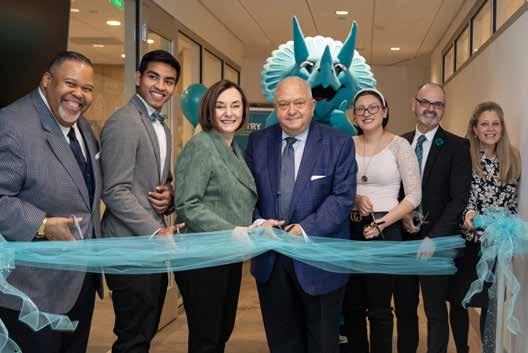
• Work with College leadership to effectively communicate institutional and student needs and promote opportunities for collaboration with external partners, stakeholders and donors.*
• Provide connection points and help develop new relationships between the Foundation and College vendors to support philanthropic endeavors.*
• Ensure continued availability of institutional funds to support resource development initiatives.
Provided $500,000 in institutional funds to the Foundation for general, workforce and access scholarship support.
Access, Learning and Success (AL&S)
Workforce, Community and Economic Development (WCED) Administration and Finance (A&F)
*Work is in progress or scheduled to begin in 2024-2025.
32
GOAL 5: FURTHER ENHANCE FUNDRAISING APPROACH
Strategically allocate and raise funds to support key student success goals.
• Inform and collaborate with Foundation to identify priority needs for external funding that align with Collegewide Academic Plan and promote student success.
Launched search for a Collegewide director of grants management. This new position will work closely with the Foundation to evaluate grant opportunities to address College, student or community issues and ensure each grant can be successfully implemented.
• Continue partnering with Foundation to identify key priorities, including barrier removal, and develop innovative initiatives to support student success.
Working with the Foundation, WCED secured over $7 million in funding to support student success, barrier removal and priority projects for the division.
• Continue engaging in regional funding collaborations that identify and pursue grant opportunities that support workforce programming.
In collaboration with the Foundation, participated in the Regional Funding Hub Talent Initiatives Working Group led by the Greater Cleveland Partnership. This working group evaluates new funding opportunities and the partnerships necessary for their success.
Through regional funding collaborations, WCED partnered with Cleveland State University, Kent State University, Baldwin Wallace University, Case Western Reserve University, Youngstown State University, Lorain County Community College, Stark State College, Lakeland Community College, MAGNET, the Greater Cleveland Partnership, Job Corps, Towards Employment, Ohio Guidestone and MetroHealth.
Since launching in July 2019, the Skills to Succeed campaign has enabled Tri-C to:
• Award $16 million in scholarships to 14,000 students
• Double annual scholarship support for diverse populations and nondegree workforce students
• Open three new campus Food Pantries with more than 8,500 visits last year alone
• Support K-12 programs that reached 76,000 youth
• Offer more than 59,000 workbased learning experiences for students
• Award more than 42,000 certificates and credentials in high-demand fields
• The Skills to Succeed campaign led to 16 new endowed funds to support Tri-C into the future and attracted over 300 new donors — more than half of whom were Tri-C alumni, a group whose engagement continues to grow.
Access, Learning and Success (AL&S)
Workforce, Community and Economic Development (WCED) Administration and Finance (A&F)
*Work is in progress or scheduled to begin in 2024-2025.
33 2023 YEAR-END REPORT
FY23 Awards and Recognitions
Cuyahoga Community College:
• Declared “Triple Crown” winner by the Government Finance Officers Association (GFOA), with multiple awards for financial reporting:
• GFOA Certificate of Achievement for Excellence in Financial Reporting for the 14th consecutive year
• GFOA Award for Outstanding Achievement in Popular Annual Financial Reporting for the 14th consecutive year
• GFOA Distinguished Budget Presentation Award for the 14th consecutive year
• Received the NorthCoast 99 award for the 17th time, recognizing the College as a best workplace for top talent
• Recognized as a “Great College to Work For” by Modern Think LLC in partnership with The Chronicle of Higher Education
• Distinguished Best in Class Award and Hall of Fame Award for Board Diversity (Large Nonprofit/Government/Public) by the Greater Cleveland Partnership Commission on Economic Inclusion
• INSIGHT Into Diversity Higher Education Excellence in Diversity (HEED) Award — a national honor recognizing U.S. colleges and universities that demonstrate an outstanding commitment to diversity and inclusion
• Received the Heart Award at The City Mission’s inaugural gala, which recognizes an individual, corporation or organization that has made a significant impact on The City Mission’s work, providing help and hope for those served by the organization
• Recognized with six District 3 Medallion awards and four National Paragon awards from the National Council for Marketing and Public Relations.
• Earned third consecutive national designation as a Voter Friendly Campus

• Selected as a College for the First Scholars Network of Institutions by the Center for First-generation Student Success
• One of 11 organizations nationally to receive 2022 Students Learn Students Vote Award for make voting easier, more accessible and equitable for higher education students
• Delta Alpha Lambda Chapter Humanitarian Achievement Award for commitment to the Greater Cleveland region and support of the African American community and students
• 2022 Stefanski Community Impact Award from University Settlement for service and commitment to the Broadway-Slavic Village neighborhoods
Michael A. Baston, J.D., Ed.D.:

• Named to Crain’s Cleveland Business Power 150
• Blacks in Management: Excellence in Leadership Award
• Cleveland Chapter of the Southern Christian Leadership Conference: Educator of the Year 2023
• Who’s Who in Black Cleveland Award
34
FY23
AWARDS AND RECOGNITION
Recognized 2023
Thank you
Just over a year ago, we embarked on a journey together. Our mission was to take an extraordinary institution that was emerging from an unprecedented time and make it even better. I’m proud of the significant accomplishments — outlined in this report — that we’ve made in the past year.
But we have only scratched the surface of what we can accomplish together.
For 60 years, Tri-C has endured its share of tests, constantly evolving to remain a beacon of light and hope to the community.
I am thankful to my predecessors, who faced and met the challenges of social unrest, economic decline, technological revolution, regional reinvention and, most recently, a global pandemic. It is my duty to build upon their legacies and move this vanguard institution forward.
Each step we have taken in the past year has advanced us along the continuum toward a stronger, more accessible and more equitable institution.
As a candidate for this position, I made three promises:
To build a more effective community college, providing greater clarity around career pathways and transitioning to an academic community model to ensure better student outcomes.
To expand the reach and influence of our College, aligning our capabilities with the needs of Northeast Ohio’s residents and businesses while strengthening our corporate and community partnerships along the way.
To commit to properly purposed leadership, demonstrating our core values in our actions and advancing Tri-C’s ongoing mission to provide access to high-quality education for all of Northeast Ohio.
In my inaugural address, I added a fourth promise, which I hope will be my legacy: A commitment to post-college success for every student, in every program, in every zip code. Regardless of where a student comes from, what their means are or what area of study they pursue, we will work tirelessly to give them a pathway to success, a degree or certificate, and a better life.
At the close of my first year, I am confident that we will achieve all this and much more.
I want to thank you, our Board of Trustees, for your passionate and diligent stewardship. I would also like to thank my leadership team and the College’s faculty, staff and students for their unwavering support and commitment. Thank you for the trust you have placed in me to lead this institution. I am honored and grateful to be in partnership with all of you.
We have made great strides in the past year, but the work is just beginning. I am thrilled and honored to continue this journey with all of you. I cannot wait to see what the coming year brings.
Sincerely,
Michael A. Baston, J.D., Ed.D. President, Cuyahoga Community College
35 2023 YEAR-END REPORT


23-0535
1963-2023


 1963-2023
1963-2023


























